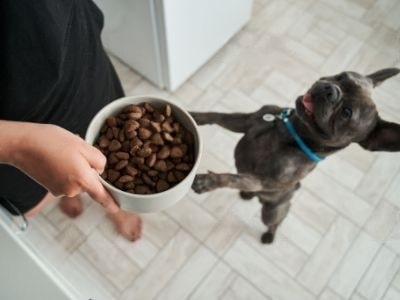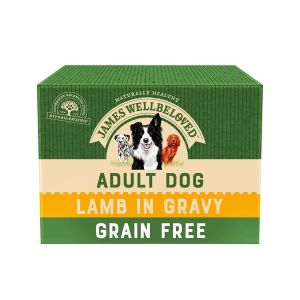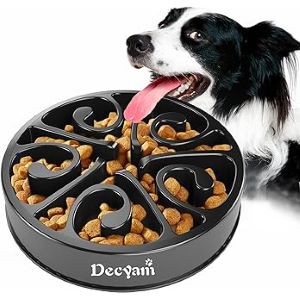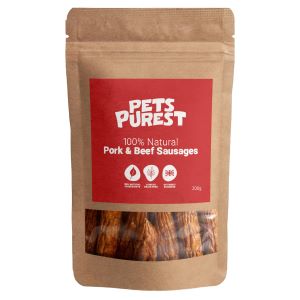There is a general perception in the dog community – they’ll eat anything you put next to them. So, whether they are hungry or not they will eat whatever you serve. But, is this perception valid? To some extent, yes, it is. However, there are many dog breeds and not all of them display such behaviour.
But, if your dog shows such behaviour, you are like – why is my doing behaving like this? Why is my dog always hungry? Why is my dog so greedy? it’s obvious that you have such queries. Let’s find out the answers to your queries.
You Might Also Like:
Why is My Dog Always Hungry?
There is no precise answer to the question but, many experts believe it’s that many dogs have a natural instinct to eat everything that is given to them. The behaviour is a reflection of the hunting instinct prior to them getting socialised.
In simple words, they used to hunt in the wild and eat whatever they could gather. At times, they might not even get the food. So, to compensate for that gap they tend to overeat. While some dogs may overcome this instinct after someone pets them, others may not.
To understand this better, let’s analyse the distinction between hunger and greed.
- The dog is genuinely hungry when: they haven’t had proper food. This means the calorie intake in the food you offered is less. The highly energetic dogs with hunting instincts are more likely to exhibit their hunger if you feed them less.
- A dog is greedy when: they receive more treats than usual, especially tasty ones. On the contrary, if you don’t feed them enough they will feel greedy the next time you serve them their food. Both situations are contrary but have a significant impact on why the dog gets greedy.
Further, the breed of dog and the health issues also make them greedy. Especially if they are showing aggressive food behaviour and being greedy, chances are they are having health issues. They are suffering from issues where their body is not processing the food they intake.
In such cases, there is a random spike in their hunger. They will act as if they didn’t eat any food at all. Diabetes, Hyperthyroidism, Cushing’s syndrome, Bacterial infection, or overgrowth in the intestines are some of the health issues that may make them feel hungry or greedy.
Why Is My Dog So Greedy?

In the previous section, saw the basic reasoning as to why dogs how greedy behaviour. let’s use this premise and see why your dog is so greedy. Here are some of the possible reasons:
1. More Hungerness
Sometimes dogs get hungry even after having their food. This happens when you make changes in their diet. The slightest change in the nutritional elements can imbalance the calorie intake and they will get more hungry.
The food content may indirectly work as a stimulant to increase their appetite and hence make them hungry. As a response to this change, you will observe a sudden shift in their behaviour and if the new treat is tasty they will get greedy.
2. Genetics
Dogs have lived in the wild for a long time. In the wild, it is difficult to meet the daily nutritional requirements. Because sometimes they get the food and sometimes not. So, whatever food they can find they grab it and store it. So, Also, the urge to eat doesn’t cool down and they get greedy when they get frequent meals from their owners.
Further, their instinct to store food doesn’t go away. You may have seen your dog hiding some food in its secret place.
3. Excitement
Whenever the dog receives their meal, you will see them lighten up. They feel the excitement and at times this feeling gets out of their control. In fact, they tend to register this positive response and get excited about seeing the smallest of the food ingredient.
This overexcitement leads to their greediness to have more food as they feel good. In comparison to the senior dogs, puppies exhibit more excitement and greediness towards food.
4. Breed
The greediness of the dog also relies on the type of breed. For instance, pugs are famous for grabbing any food item they see. In addition, these dogs get greedy every time they manage to snatch some food and store it for using it again.
Some other breeds which are obsessed with food and show greedy behaviour are- Beagle, Rottweiler, Dachshund, English Bulldog, Cavalier King Charles Spaniel, Labrador Retriever, Cocker Spaniel, and Basset Hound.
5. Treat rewards
When you give reward treats to control a dog’s greedy behaviour, it can backfire. Your furry friend gets a sense that this greedy behaviour is getting them the extra food treats. So, they deliberately express such behaviour in hope of gaining more meals.
In addition, if this behaviour transforms into a habit, it gets difficult to handle the dog. For instance, if you know their deliberate behaviour and stop giving them the treats, they might behave aggressively. Also, you will never really know if they are hungry or not because they are often pretending.
6. Jealous of fellow canine
As a dog owner, you may often see your dog not responding well to the presence of another canine. Especially if you pet a new dog in the house. They feel threatened by their presence and will start showing aggressive and greedy behaviour. But, why?
Well, seeing you give them more attention may create an impression in their mind that now they won’t get food meals as usual. This almost triggers their storing instinct and whenever you will give them food they will take whatever they can and store it.
How To Deal With a Dog That Is Always Hungry?
You only need to take your dog to the vet if the greedy behaviour is persistent or you observe any health issues. So, you can leverage some basic tricks at home to deal with your greedy dog.

- Give less food
When your dog is getting hungry and is eating more than usual, start reducing the treat frequency. There is no guaranteed result but, if your dog was pretending to get more food, it may stop behaving in such a manner.
- Make the treat challenging
Dogs feel excited after eating the food and that’s why they demand more. You can use this aspect and make their treat challenging. This means feeding them using interactive toys or puzzles. The major benefit of using this trick is your dog gets food, stimulation and exercise.
- Try using slowing down their food intake
When your furry friend is greedy for food, you will see them finish up their meal quickly. To get this situation under control, you can try using a slow-release feeder. These feeders will basically slow down the pace of food intake and also help with digestion.
- Use wet food
Wet food can easily deceive your dog’s hungriness. It sits better in your furry friend’s stomach and they will feel full after eating such a wet meal. This happens because the moisture makes their meal heavy and your dog will feel it has eaten enough.
Further, in comparison to dry food, wet food is low in calories, so you can even increase some quantity and make your dog think that wet food is better and they will get satisfied with the treat.
- Soaking
In this approach, you need to soak the food of your furry friend before serving it. Make sure you do this in advance i.e. about an hour ago. You will see the food absorb the liquid and expand. This approach will help you control your dog’s eating speed, and help with their digestion as well.
- Schedule up their diet routine
Scheduling a proper diet routine will help improve the dog’s health and maintain its appetite. You need to observe their eating behaviour and track the timing. This will help you figure out the appropriate time to feed them because you will get a rough idea of which time they feel hungry.
Once you get the idea, you can split their meals accordingly. For instance, if your furry friend gets hungry in the evenings, feed them a complete meal during that period. This doesn’t mean you skip their breakfast, just make sure you feed less. Also, if the exercise routines are in sync with their meals, they will maintain a healthy shape as well.
Give these tricks a shot, and see if they work. And if your furry friend is obeying your commands and following the diet, you won’t have to take them to the vet. But, if they don’t work you may have to consult a vet to get treatment for such hungriness and food obsession. So, what are the possible health issues and how you can identify them?
Identifying health issues
Dog owners tend to mistake the dog’s obsessive behaviour with eating food as their sign of happiness. This mistake is common among beginners. The willingness to eat all the time out of greediness and obsession is dangerous.
Overeating can cause different health issues for your furry friend. These issues are:
- Obesity
- Heart or liver disease
- Kidney issues and so on.
Now, even after overeating, if your dog remains hungry all the time, then it’s a health concern. Ignoring the signs can have devastating effects on their lifestyle. So, it’s crucial to identify the signs or symptoms to identify a potential health issue. Also, figuring out the reasons why there is a sudden increase in your dog’s appetite is also necessary.
Potential health issues
Your dog will have the following health issues when they are constantly hungry:
- Signs of vomiting or diarrhoea
- Increase in thirst
- Inconsistent weight changes i.e. loss or gain
- Excessive urination
- Shrinking muscles and changes in body shape
Increased Appetite In Dogs
There are ample reasons why there is a sudden peak in appetite for dogs. It’s hard to anticipate the exact cause. Seeking a vet consultation is the best way to get a clear insight into why your furry friend’s appetite increased. Below are some of the possible reasons for an increased appetite in dogs:
- The ageing factor – as dog ages, it will soon begin to develop more hunger for food
- Psychological issues: anxiety or stress can also lead to obsessive eating
- Poor nutrition: either the dog is getting excessive or too little food
- Cushing’s disease (hyperadrenocorticism)
- Medication reaction
- Metabolic illnesses, such as diabetes mellitus & hypoglycemia
- Gastrointestinal issues that interrupt nutrient absorption can also increase appetite, these include:
- Cancer
- Inflammatory bowel syndrome
- Exocrine pancreatic insufficiency
- Parasites/infections that hamper nutrient absorption also elevate the hunger
So, how does a vet identify the cause? Let’s see.
A vet will execute different tests for identifying the cause for such a sudden rise in your dog’s appetite. Following is the diagnostic method your vet may use:
- Check the entire medical history and conduct a physical examination
- Blood tests (for getting a complete blood count)
- Urinalysis
- Fecal flotation and giardia test for parasites
- Adrenocorticotropic hormone (ACTH) stimulation test to check for Cushing’s disease
- Ultrasound
- Check for exocrine pancreatic inefficiency
- Endoscopy examination
Treatment for increased appetite in dogs
Once the vet identifies the cause for the sudden elevation in the appetite, they will proceed with the treatment. In general, they will consider the symptoms of polyphagia and provide care for the dog accordingly. Other medical conditions will be handled differently. Let’s see how.
- For behavioural-related conditions, the vet may suggest feeding them small amounts of food and also keep monitoring their intake.
- If it’s Cushing disease, they will provide you with a prescription.
- Your furry friend may need insulin infections if the diagnosis indicates metabolic issues such as diabetes.
- If there is an infection or parasite deworming treatment or medication will be the option.
- In case your dog has pancreatic insufficiency, the vet will tell you to modify their diet and provide some medications.
- If it’s cancer, the dog will go through surgery, chemotherapy, and other radiation treatments.
FAQs
Why is my 4 month old puppy always hungry?
Your 4 month old puppy is always hungry because they are growing. In fact, in comparison to the senior dogs, they are evolving 20 times faster. They need more energy while they are growing and hence, you will see them being hungry all the time.
Why is my dog suddenly hungry all the time?
Mentioning the exact reason is difficult, however, one can easily consider a psychological issue or an underlying medical condition or the dog is simply not getting enough nutrients. There are many such reasons which indicate hunger and this eventually leads to their obsession with eating food all the time.
Why are dogs so greedy and obsessed with food?
For dogs, food is a natural instinct, especially in the wild. They have a habit of hunting down prey for their supper. Also, when they are in the wild, chances are they won’t get food for many days. This uncertainty makes them store the food and eat it for longer periods. This habit doesn’t go away and as a dog owner, you may also see them licking the leftovers after the meal.
How many meals should a dog have in a day?
Normally, a dog can have two meals per day. Each meal has a buffer of 12 hours. Also, some dogs may need more meals i.e. about three to four a day. The meals count entirely comes down to dog breed and their appetite. However, a dog owner must see that the dog isn’t hungry for more than 14 hours as their stomach may get hyper-acidic. This can result in vomiting and nausea.
Why Is My Dog Always Hungry? -Concluding Remarks
In conclusion, when your furry friend is always hungry and eats a lot of food, it’s harsh or rather unfair to use the term greedy. Because it’s possible they are lacking basic nutrients in their current meal. Also, there are different genetics, medical conditions and behavioural prospects that make them greedy for food.
In addition, you also need to determine whether your dog is behaving intentionally or is actually greedy for food. While you may think of reducing their diet, it may even elevate the situation. So, if they show excessive behaviour of greediness and remain are always hungry take them to the vet before compromising their diet.






